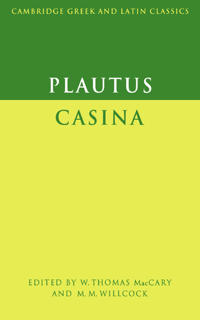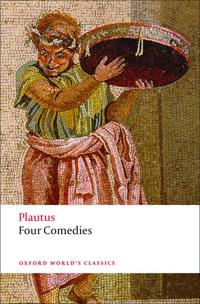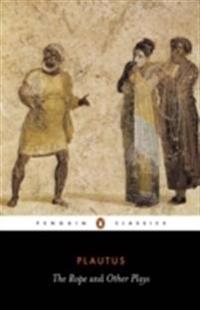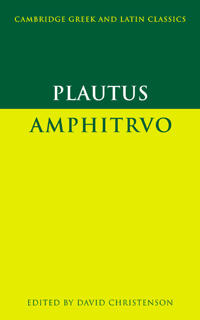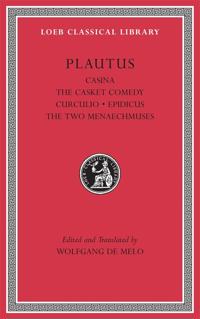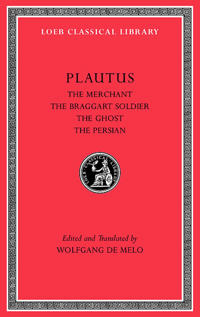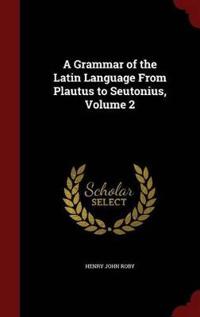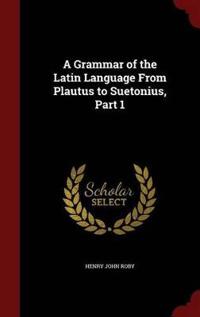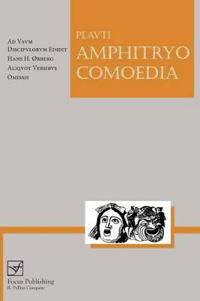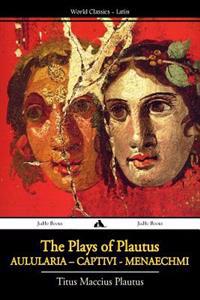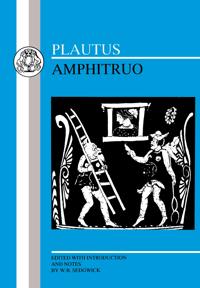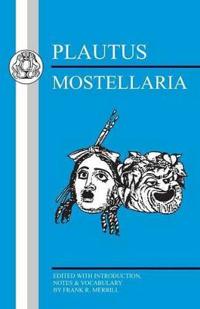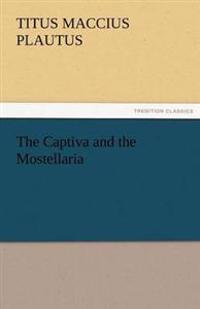Plautus: Casina (Häftad)
avTitus Maccius Plautus
ISBN: 9780521290227 - UTGIVEN: 1976-05Plautus' Casina is a lively and well composed farce. The plot, which concerns the competition of a father and his son for the same girl and the various scurrilous tricks employed in the process, gives full scope to Plautus' inventiveness and richly comic language. The editors' aim is to establish th[...]
Four Comedies (Pocket)
avPlautus, Erich Segal, Plautus
ISBN: 9780199540563 - UTGIVEN: 200806Plautus was the single greatest influence on Western comedy. Shakespeare's Comedy of Errors and Moliere's The Miser are two subsequent classics directly based on Plautine originals. Plautus himself borrowed from the Greeks, but his jokes, rapid dialogue, bawdy humour, and irreverent characterization[...]
The Rope and Other Plays (Storpocket)
avTitus Maccius Plautus
ISBN: 9780140441369 - UTGIVEN: 1975-08Brilliantly adapting Greek New Comedy for Roman audiences, the sublime comedies of Plautus (c. 254 -184 bc ) are the earliest surviving complete works of Latin literature. The four plays collected here reveal a playwright in his prime, exploring classic themes and developing standard characters that[...]
The Pot of Gold and Other Plays (Storpocket)
avTitus Maccius Plautus
ISBN: 9780140441499 - UTGIVEN: 1973-03One of the supreme comic writers of the Roman world, Plautus (c.254-184 BC) skilfully adapted classic Greek comic models to the manners and customs of his day. This collection features a varied selection of his finest plays, from the light-hearted comedy "Pseudolus", in which the lovesick Calidorus [...]
Plautus: Amphitruo (Häftad)
avP. E. Easterling
ISBN: 9780521459976 - UTGIVEN: 200007Plautusâ Amphitruo is the sole specimen of mythological burlesque in ancient comedy to come down to us in nearly complete form. This sex farce delighted Roman audiences and readers for centuries and continues to inspire adaptations to this day. Dr Christenson utilizes recent work in performanc[...]
Casina, The Casket Comedy, Curculio, Epidicus, The Two Menaechmuses (Inbunden)
avTitus Maccius Plautus
ISBN: 9780674996786 - UTGIVEN: 201105The rollicking comedies of Plautus, who brilliantly adapted Greek plays for Roman audiences c. 205--184 BCE, are the earliest Latin works to survive complete and are cornerstones of the European theatrical tradition from Shakespeare and Moliere to modern times. This second volume of a new Loeb editi[...]
The Merchant, The Braggart Soldier, The Ghost, The Persian (Inbunden)
avTitus Maccius Plautus
ISBN: 9780674996823 - UTGIVEN: 201111The rollicking comedies of Plautus, who brilliantly adapted Greek plays for Roman audiences c. 205--184 BCE, are the earliest Latin works to survive complete and are cornerstones of the European theatrical tradition from Shakespeare and Moliere to modern times. This third volume of a new Loeb editio[...]
M. Accii Plauti Rudens, UT Est Habita Apud Westmonasterienses, Anno 1798. (Häftad)
avTitus Maccius Plautus
ISBN: 9781140761051 - UTGIVEN: 2010-05A Grammar of the Latin Language from Plautus to Seutonius, Volume 2
ISBN: 9781296708610 - UTGIVEN: 2015-08A Grammar of the Latin Language from Plautus to Suetonius, Part 1
ISBN: 9781298680518 - UTGIVEN: 2015-08Plavti (Pocket)
avPlautus, T. Maccii Plavti, Hans H. (EDT) Orberg
ISBN: 9781585101948 - UTGIVEN: 2014-03Plautus - Amphitruo
ISBN: 9781853993497 - UTGIVEN: 1993-01This school edition was first published in 1960. It includes an introduction discussing date, sources, revivals, manuscripts, metre, arguments and prologues. The Latin text is accompanied by notes explaining the irregularities of Plautus' syntax and metre, and citing relevant parallels and secondary[...]
Mostellaria (Häftad)
avTitus Maccius Plautus
ISBN: 9781853996382 - UTGIVEN: 2002-07"Mostellaria" is one of Plautus' most lively plays. Probably based on a Greek original, Philemon's "Ghost", it concerns the scheming slave Tranio's attempts (including the invention of a haunted house) to disguise from his old master the sexual and financial prodigality of the latter's son. The comp[...]
The Captiva and the Mostellaria (Häftad)
avTitus Maccius Plautus
ISBN: 9783842429642 - UTGIVEN: 2011-11

